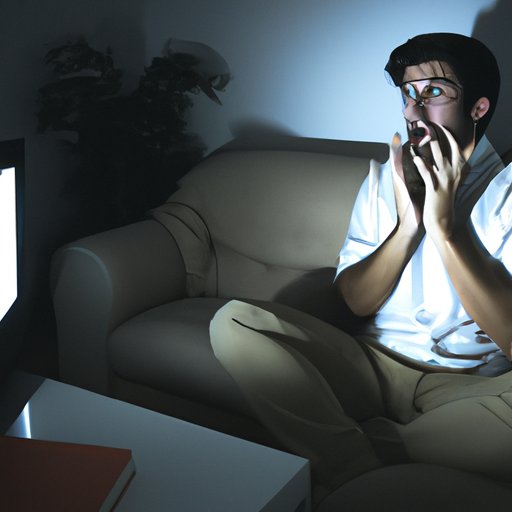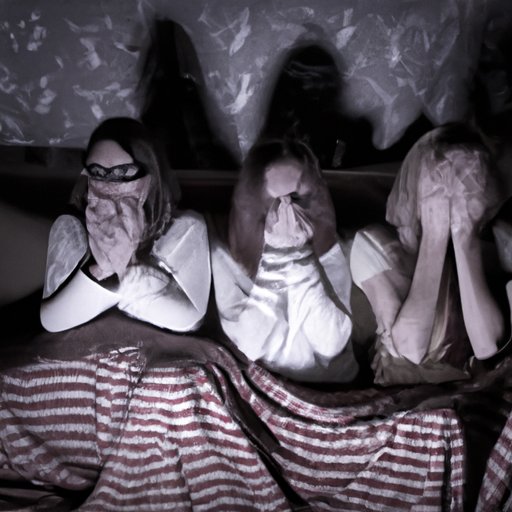Introduction
Scary movies are a popular form of entertainment that can be found in almost every culture. These films often involve strange creatures, supernatural phenomena, or suspenseful storylines that evoke feelings of fear and anxiety in viewers. In this article, we will explore the psychological and cultural effects of watching these types of movies, as well as strategies for managing fear after viewing them.
Examining the Psychological Impact of Scary Movies
When humans experience fear, their bodies respond by releasing hormones such as adrenaline and cortisol. This response is known as a “fight-or-flight” reaction, which prepares the body to either fight off a threat or flee from it. While this response can be beneficial in real-life emergencies, it can also be triggered by watching scary movies.
The short-term effects of fear can include an increased heart rate, rapid breathing, sweating, and trembling. In the long-term, these responses can lead to chronic stress, which can have serious implications on physical and mental health. Additionally, watching horror films can trigger anxiety and panic attacks in some viewers.

Exploring the Benefits and Disadvantages of Watching Scary Movies
Despite the potential psychological effects, there are also some possible benefits to watching these types of movies. Horror films can help viewers confront their fears in a safe environment, which can provide a sense of empowerment. Additionally, the adrenaline rush associated with fear can be exhilarating, providing a feeling of excitement.
On the other hand, scary movies can have some negative effects as well. Viewers may become desensitized to violence and gore, which can lead to a warped view of the world. Additionally, some individuals may find themselves constantly seeking out more extreme forms of entertainment in order to achieve the same level of fear.
Investigating the Effects of Scary Movies on Young People
Young people are particularly susceptible to the effects of horror films. Children and teenagers are still developing emotionally and psychologically, so exposing them to graphic images or intense fear-inducing scenarios can have long-lasting impacts. Additionally, younger viewers may not be able to distinguish between reality and fantasy, making them more vulnerable to the effects of these movies.
There are several strategies for mitigating the risks associated with watching horror films. Parents should be aware of the types of movies their children are watching, and ensure that they are age-appropriate. Additionally, parents should talk to their children about the film and discuss any fears or anxieties they may have afterwards.
How to Manage Fear After Watching a Scary Movie
For viewers who find themselves feeling overwhelmed by fear after watching a horror movie, there are several coping mechanisms that can help manage these feelings. Taking deep breaths, engaging in positive self-talk, and focusing on calming activities such as yoga or meditation can all help reduce anxiety levels.
In addition, viewers should avoid watching scary movies before bedtime, as this can increase the risk of having nightmares or other forms of trauma. If viewers find themselves feeling particularly anxious after watching a horror movie, it may be helpful to speak with a mental health professional to get additional support.

Analyzing the Cultural Significance of Scary Movies
Horror films have been part of popular culture since the late 19th century, and continue to be a powerful and influential force today. These films often reflect the fears and anxieties of the time period in which they were made, providing insight into the cultural context of the era.
Additionally, horror films can serve as a form of social commentary. They often challenge traditional values and beliefs, offering critiques of society and its institutions. As such, these films can provide valuable perspectives on issues such as gender roles, race, and class.

Comparing Horror Films Across Different Genres
Horror films come in many different shapes and sizes, ranging from slasher flicks to supernatural thrillers. Each genre has its own unique elements, and varying levels of popularity. Slasher films, for example, tend to focus on blood and gore, while supernatural films often explore themes of the afterlife and the unknown.
Psychological horror films are typically more cerebral, relying on subtlety and atmosphere to create an unsettling tone. Zombie films, meanwhile, focus on the survival of humanity in a post-apocalyptic world. Regardless of the genre, each type of horror film can provide an entertaining and thought-provoking viewing experience.
Conclusion
In conclusion, watching scary movies can have both psychological and cultural effects. While these films can provide an exhilarating experience, they can also have a negative impact on viewers, particularly young people. Strategies such as monitoring what types of films children watch and talking to them afterwards can help mitigate some of the risks associated with viewing horror films. Additionally, viewers should practice coping mechanisms for managing fear and avoiding nightmares.
Ultimately, horror films are an important part of popular culture, and can provide valuable insights into the fears and anxieties of the time period in which they were made. Whether you prefer slasher films, supernatural thrillers, psychological dramas, or zombie movies, there is something for everyone in the horror genre.
(Note: Is this article not meeting your expectations? Do you have knowledge or insights to share? Unlock new opportunities and expand your reach by joining our authors team. Click Registration to join us and share your expertise with our readers.)
